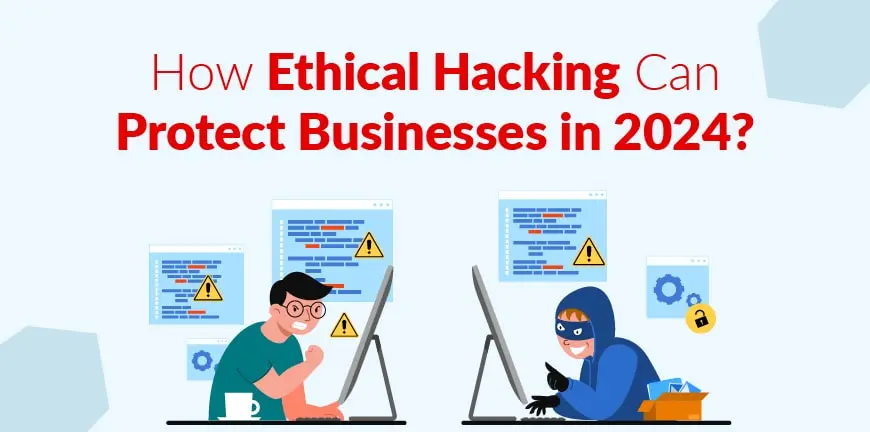
Types of Employee Benefits: 5 Benefits HR Should Know
04/09/2024
10 Effective Methods of Recruitment
09/09/2024All is not hunky dory and smiling faces do not tell the whole story. As organizations go about their daily business, there is a larger invisible threat that comes up very frequently. In Q2 2024, cyberattacks increased 30% YoY, to 1,636 attacks per organization per week. This is an overlooked weakness.
Where Do Our Strengths Lie?
And our strengths lie in identifying our weaknesses. Ethical hacking is largely built on this premise. With processes becoming streamlined and faster, there is a tendency to overlook vulnerabilities in applications, and this can happen on any platform, be it the mobile you text up to 12 hours or even more a day or your business laptop.
Enter Ethical Hacking
Ethical hacking, also referred to as white-hat hacking, helps businesses identify threats before they arise, turn the same threats into opportunities for learning and strengthen their applications and enterprise networks against any malware that could arise in the future. Here are some ways that ethical hacking can help businesses in 2024.
1. Identifying Vulnerabilities
In the first 8 months of 2024, of 22,313 reported vulnerabilities, only 204 were actively weaponized. Ethical hacking can help identify vulnerabilities in the business. This is done by simulating the attack within the network and the application. Some of the vulnerabilities that ethical hacking can help identify are:
Broken authentication: Flawed authentication methods can lead to broken or incorrect access grants, which in turn can lead to identity theft.
Weak firewalls: A weak firewall will not be able to prevent malware or spam from affecting the system.
Cracked Wi-Fi passwords: If your Wi-Fi password is cracked, then it becomes easy for hackers to plant malware on target systems on the network.
2. Compliance with Regulations
Companies need to be compliant with regulations such as GDPR (for data safety), HIPAA, PCI DSS3, all of which help to certify the company as one that safeguards data and maintains a safe network where all the transactions are private and secure. Getting approval from regulatory bodies is a key part of ensuring that business can go on without any interruptions.
3. Protecting Sensitive Data
Ethical hackers help identify the data that is most likely to be stolen or ransomed after a data breach. Identifying the data that is of highest importance and risk helps companies create backups of it in preparation for a possible data breach.
4. Strengthening Security
Ethical hacking helps develop a security posture for you. If you are a company that as yet doesn’t value any investments in security but has a lot of data that is very vital to your company, either employee or customer or investment data, then you need to invest more in establishing security protocols, understanding security concerns and assigning stakeholders and acquiring the necessary infrastructure.
5. Incident Response
By understanding the likely threats within an application or network, it is possible to plan for any eventualities that may arise. For instance, a broken authentication may need a review of authentication methods and access control. A cracked Wi-Fi password might need a move to a stronger password and protection against brute force hacks. These techniques and specific tools can ensure that businesses identify the latest developments in the threat landscape and work towards building a wall against them.
6. Building Employee Safety and Trust
Social engineering attacks make use of social media and other websites links to lure people into sharing their information or downloading content or malware to their systems that can compromise their security even without them realizing it. Some of the common social engineering attacks that employees must be on-guard against are pretexting, baiting, phishing, water-holing, tailgating, and spear-phishing.
7. Building Customer Confidence and Trust
Customer confidence will increase if you let them know that the network is protected by advanced encryption standards. They can rest assured that their privacy is maintained, and their data is safe. This helps increase customer satisfaction and boost your reputation and even bring in much-needed revenue.
Closing Words
The pandemic forced enterprises to move to an online or hybrid mode of working. With the increase in cyberattacks over the last 3 years, ethical hackers have become the engineers of enterprise armies, picking up mines as they move over the online battlefield.
More and more enterprises are putting their trust in ethical hacking to ensure data of the company, vendors, employees, customers and others remains secure. And their trust is well-found. With the rise of AI, a lot of threat detection and response will be automated, but we still need ethical hackers to help us fight this battle. And the numbers we quoted initially tell us we have a long way to go. What are your thoughts on this?
Contact Us For Business Enquiry

Rajkumar Shanmugam
Rajkumar Shanmugam is the Head of HR at ALP Consulting, bringing over 19 years of comprehensive HR leadership experience across India and international markets. His expertise spans talent acquisition, employee relations, performance management, compliance, and HR transformation. Rajkumar has a proven track record of driving people-centric initiatives, enhancing workplace culture, and aligning HR strategy with business goals. With extensive experience in US staffing operations and global mobility, he continues to lead organizational excellence through innovation and employee engagement.




